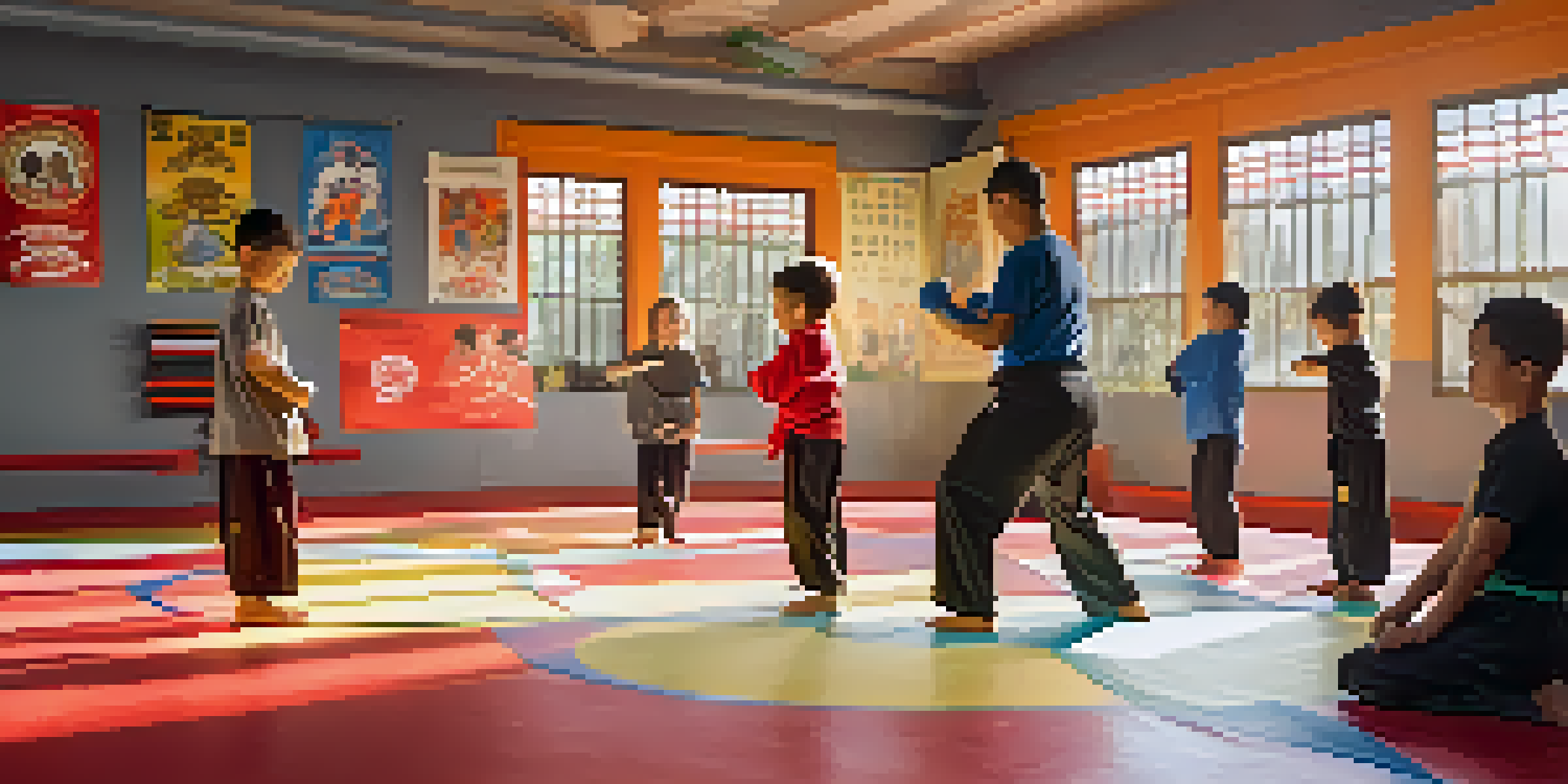How to Introduce Self Defense Concepts to Your Children

Understanding the Importance of Self Defense for Kids
Teaching self-defense to children is about more than just physical skills; it's about instilling confidence and awareness. In a world where safety can sometimes feel uncertain, equipping kids with tools to protect themselves is essential. This foundational knowledge empowers them to navigate various situations, whether at school, in the neighborhood, or online.
The best way to predict your future is to create it.
Self-defense helps children develop a sense of personal responsibility and the ability to assess situations critically. By understanding their surroundings and recognizing potential dangers, they can make better choices to keep themselves safe. This awareness can significantly reduce the likelihood of becoming a target.
Moreover, learning self-defense promotes physical fitness and discipline. As children engage in training, they not only improve their strength and coordination but also learn the value of perseverance and respect for themselves and others. These are life skills that extend beyond self-defense.
Choosing the Right Self Defense Program for Your Child
When selecting a self-defense program, consider your child's age, interests, and learning style. Different disciplines, like martial arts, Krav Maga, or even basic safety courses, offer varied approaches to self-defense. Finding a program that aligns with your child's preferences will make the experience more enjoyable and engaging.

Look for programs that emphasize not just physical techniques but also conflict resolution and verbal de-escalation. Teaching children how to communicate effectively and avoid confrontation is just as crucial as learning how to defend themselves physically. Programs that blend these elements provide a comprehensive approach to safety.
Empower Kids with Self-Defense Skills
Teaching self-defense equips children with confidence, awareness, and vital life skills for navigating various situations.
Lastly, ensure that the instructors are experienced and have a proven track record with children. A supportive and understanding teacher can make all the difference in your child's learning journey. Observing a class beforehand can give you insight into the instructor's style and the environment.
Creating a Safe Space for Learning Self Defense
Establishing a comfortable environment is key to helping your child embrace self-defense concepts. Discuss with them the importance of the skills they're about to learn and encourage open communication about their feelings. Acknowledge any fears they might have and reassure them that it's okay to feel nervous.
Self-defense is not just a skill; it's a mindset.
Consider setting up practice sessions at home where your child can apply what they've learned in a safe and controlled setting. This could be as simple as role-playing scenarios or practicing techniques together. Creating a routine can make the learning process feel more natural and less intimidating.
Additionally, celebrate their progress, no matter how small. Positive reinforcement boosts confidence and encourages children to keep practicing. Acknowledging their achievements can transform their initial apprehension into excitement.
Incorporating Self Defense into Daily Life
Integrating self-defense principles into everyday situations can help reinforce what your child learns in class. For instance, practice situational awareness when out in public, discussing how to identify safe spaces and trusted adults. These discussions can turn into valuable lessons without feeling like a chore.
Encourage your child to use their voice and express their feelings in various situations. Teaching them to assertively say 'no' or ask for help can be a form of self-defense too. These skills empower them to stand up for themselves in everyday interactions, fostering independence.
Choose the Right Program for Kids
Selecting a self-defense program that matches your child's interests and learning style enhances their engagement and enjoyment.
Moreover, use everyday activities as opportunities to teach self-defense principles. Whether it's practicing walking home safely or navigating social situations, real-life applications make the lessons more relatable and memorable.
Teaching Conflict Resolution and Verbal Skills
Self-defense isn't solely about physical confrontation; it's also about handling conflicts with words. Teaching your child effective communication skills can help them defuse potentially dangerous situations without resorting to violence. Role-playing different scenarios can be a fun and informative way to practice.
Discuss the importance of staying calm and thinking clearly during conflicts. Children who can manage their emotions are better equipped to handle challenging situations. Encourage them to take deep breaths and think before reacting, instilling a sense of control over their actions.
Moreover, emphasizing empathy can also be a form of self-defense. Understanding others' perspectives can lead to more peaceful resolutions. By encouraging kindness and compassion, you're helping your child navigate social dynamics while keeping themselves safe.
Encouraging Regular Practice and Physical Fitness
Regular practice is essential for reinforcing self-defense skills. Encourage your child to attend classes consistently and engage in additional physical activities that promote fitness, like swimming, dancing, or team sports. A well-rounded approach to fitness enhances their ability to perform self-defense techniques effectively.
Make practice a family affair! Engaging in physical activities together not only strengthens your bond but also makes learning self-defense fun. You might even discover hidden talents or interests in other areas, fostering a broader appreciation for movement and exercise.
Support and Trust Foster Learning
A strong support system and open communication encourage children to share their experiences and feel more secure in their self-defense journey.
Additionally, set achievable goals together. Whether it's mastering a specific technique or participating in a self-defense competition, having goals can motivate your child to stay committed. Celebrate their milestones along the way, reinforcing the importance of perseverance and hard work.
Emphasizing the Role of Trust and Support
A strong support system is vital for children learning self-defense. Encourage your child to share their experiences and feelings about what they're learning. Being a supportive listener helps them process their emotions and reinforces the idea that they're not alone in this journey.
Involve family members, friends, or even neighbors in discussions about self-defense. Creating a community of understanding can make your child feel more secure and empowered. They can share tips, practice together, and even attend events as a group, reinforcing positive experiences.

Ultimately, let your child know that it's okay to seek help if they ever feel overwhelmed or unsure. Knowing they have a trusted adult to turn to fosters confidence and resilience, important traits for navigating life's challenges beyond self-defense.